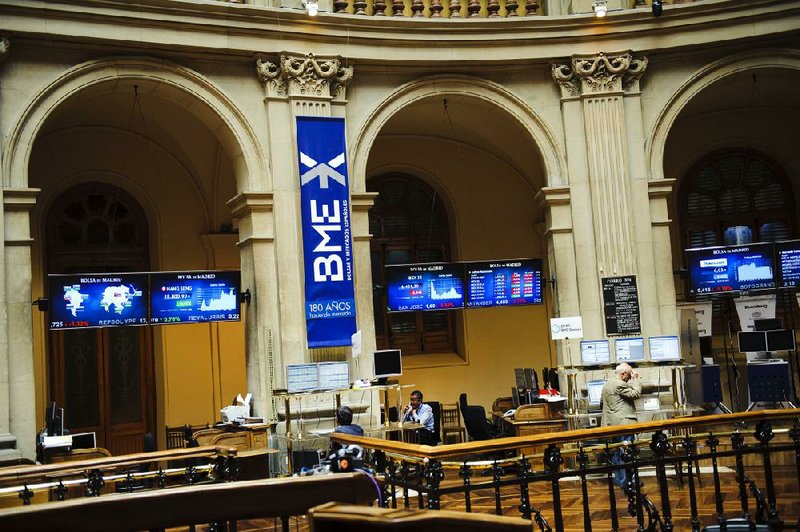MADRID, Spain — Conservative Spanish Prime Minister Mariano Rajoy insisted Monday that the country’s banking sector would not need an international rescue as concern over the bailout of nationalized lender Bankia sent its stock price plummeting while Spain’s borrowing costs soared.
“There will be no rescue of the Spanish banking sector,” Rajoy said at a press conference.
However, he added that the government had no choice but to bail out Bankia, which has been crippled by Spain’s real-estate slump.
“We took the bull by the horns because the alternative was collapse,” said Rajoy, stressing that Bankia clients’ savings were now safer than ever.
Bankia, Spain’s fourth-largest bank, is estimated to have $40.1 billion in toxic assets and was effectively nationalized earlier this month when the government converted $5.6 billion in rescue funds it gave last June into shares.
The lender’s shares fell 28 percent on opening in Madrid on Monday - Bankia’s first day back on the stock exchange after its announcement Friday that it would need the $23.8 billion in state aid to shore itself up against its bad loans, a far bigger bailout than expected. The shares, which recovered slightly in the afternoon, closed 13.4 percent lower at $1.70.
Meanwhile, Spain’s main stock index closed at an almost nine-year low Monday and interest rates on the government’s 10-year bonds rose on concerns about the government’s ability to sort out the country’s banking industry. The euro dropped from $1.2578 on Friday to near 11-month lows of $1.2531 on Monday.
Other European stocks indexes also mostly fell. France’s CAC-40 closed 0.2 percent lower at 3,042.97 and Germany’s DAX dropped 0.3 percent to 6,323.19 after modest gains in the morning. Britain’s FTSE 100 rose 0.1 per cent to 5,356.34.
Bank of Spain estimates show Spain’s lenders are sitting on some $233 billion in assets that could cause them losses. The government fears the cost of rescuing the country’s vulnerable banks could overwhelm its own finances, which are already strained by a double-dip recession and an unemployment rate of nearly 25 percent, and force it to seek a rescue by the rest of Europe.
Among the chief concerns surrounding Bankia’s request for state aid - the largest in Spanish history - is how Spain plans to fund it. The country’s borrowing costs have risen sharply over the past few weeks.
On Monday, Spain’s interest rate, or yield, for 10-year bonds on the secondary market - a key indicator of market confidence - rose 0.16 percentage point to close at 6.45 percent. Rajoy said this had more to do with broader concerns about Europe and Greece and dismissed suggestions it had anything to do with Bankia.
A rate of 7 percent is considered unsustainable over the long term and there is concern that Spain might soon be pushed to join the ranks of Greece, Ireland and Portugal and seek an international bailout.
The prime minister said that the government had not yet decided how it would proceed in funding the Bankia bailout.
However, the Economy Ministry said earlier Monday that it is considering injecting government debt into Bankia’s accounts. The bank could then turn to the European Central Bank and use those bonds as collateral to receive cash for the recapitalization.
Spain established a mechanism in February for using debt issued by the government or the bank-rescue fund to recapitalize banks. Lenders can use government-issued debt as collateral to borrow from the European Central Bank. The rescue fund has $6.3 billion in available funds, leaving its ability to bail out lenders dependent on Spain’s access to markets.
Rajoy said at a Madrid news conference Monday that the government hadn’t spoken to the European Central Bank about such a step.
Analysts said that such a technique would only prove to investors that the country is having difficulties raising money on the international debt markets and would therefore make them even more reluctant to buy Spanish debt.
“It sends a signal of a lack of confidence,” said Mark Miller of Capital Economics in London.
Spain’s rocky financial situation has been made worse because of overspending by its semi-autonomous regions. One of the regional governments, Catalonia, called for financial assistance last week, claiming it was running out of options to refinance its debts.
Asked about the fragile state of finances of some of Spain’s regions, Rajoy said, “We are not going to let any region or financial entity fall because otherwise the country would fall.” Information for this article was contributed by Ciaran Giles, Daniel Woolls, Nataliya Vasilyeva and Pamela Sampson of The Associated Press and by Emma Ross-Thomas and Charles Penty, Ben Sills and Gabi Thesing of Bloomberg News.
Front Section, Pages 6 on 05/29/2012
